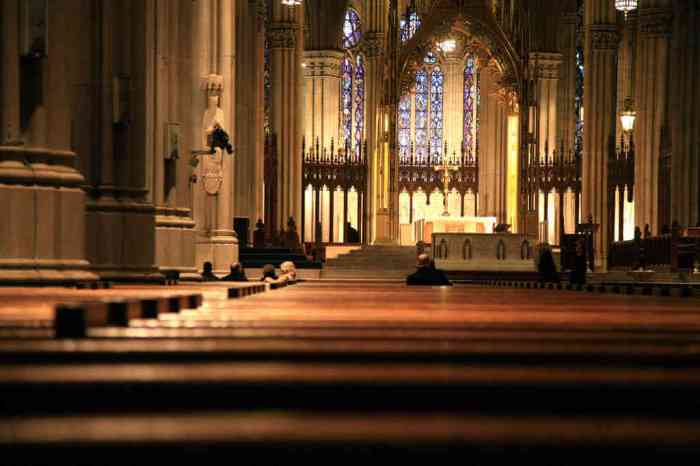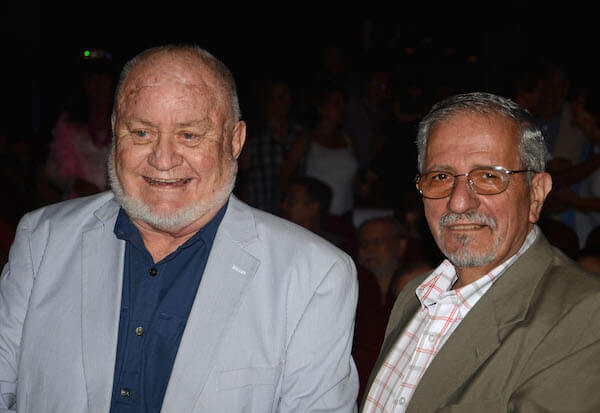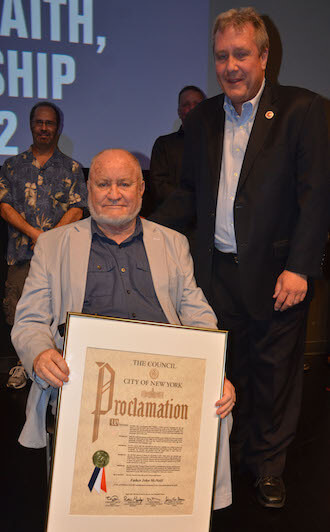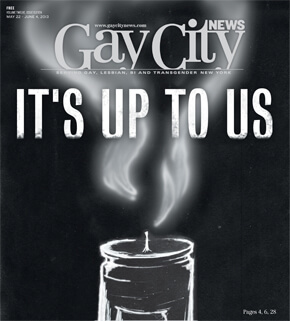Cardinal Jorge Mario Bergoglio, the archbishop of Buenos Aires, appears on the balcony at the Vatican as Pope Francis I. | VATICAN.VA
BY ANDY HUMM | Argentine Cardinal Jorge Mario Bergoglio, 76, was elected Pope Francis I on March 13 despite his failure to stop the progressive government of President Cristina Kirchner from opening marriage to same-sex couples — the first Latin American country to do so — and from making contraceptives available to all.
He also presided over the Church in a country where two-thirds of the people are Roman Catholic but less than 20 percent attend Mass regularly.
Bergoglio condemned opening adoptions and marriage to gay couples as a threat to children, writing, “At stake is the identity and survival of the family — father, mother, and children. At stake are the lives of many children who will be discriminated against in advance and deprived of their human development given by a father and a mother and willed by God. At stake is the total rejection of God’s law engraved in our hearts.”
President Kirchner condemned his pronouncements as reminiscent of “medieval times and the Inquisition.”
The Argentine LGBT Federation expressed “deep regret” at Bergoglio’s election, saying in a statement that it “marks a clear desire of the Vatican to radicalize its position against the recognition of diverse family structures.”
The group cited in particular his reference to marriage equality as “the plan of the devil.”
Esteban Paulón, its president, said the group was not optimistic given the new pope’s record, but added, “Perhaps the fact that Pope Francis has lived in a country where marriage equality is a reality and none of the catastrophes he predicted have come to pass might make him reconsider his negative stand on issues related to equality.”
Paulón called on Francis, as a first step, to reverse Vatican opposition to the United Nations declaration calling for an end to the criminalization of homosexuality.
The New York Times reported that as archbishop of Buenos Aires, he pushed his fellow bishops to support civil unions as a way to stop the momentum of the marriage equality bill in 2010. The majority of the bishops overruled him, but a right-wing senator, Liliana Negre de Alonso, a member of the ultraconservative Catholic group Opus Dei, introduced such a bill only to see it shot down in the national parliament for creating a “separate-but-equal” status for gay couples, J. Lester Feder reported on BuzzFeed.
Feder wrote that Bergoglio was publicly so “tone-deaf” in opposing marriage equality “that many observers credit him with helping the law pass.” But Feder also wrote that the former prelate learned from “the mistakes his Church made” in the fight and that the Argentine Church “moderated its tone when fighting social issues” after its loss on marriage.
The Times also reported that Bergoglio met twice with gay activist and theologian Marcelo Márquez, who said, “He told me that homosexuals need to have recognized rights and that he supported civil unions, but not same-sex marriage.”
But Francis is from a group of men — the cardinals who elected him — who have been unanimous in their opposition to any form of legal protections based on sexual orientation and gender identity. Indeed, no one got to be so much as a bishop under the Pope Benedict XVI or his predecessor, John Paul II, unless they enthusiastically opposed LGBT rights, women’s ordination, abortion, and even artificial contraception.
The greatest controversy surrounding the new pope, however, is his role as leader of the Jesuits in Argentina during the “Dirty War” there beginning in the late 1970s, when a repressive junta murdered thousands and cracked down on dissent, including Catholic liberation theologian priests. Just as Pope Pius XII disgraced himself by not speaking out against Nazi barbarism during World War II, Bergoglio was silent during the junta and Church leaders supported it. It was not until 2010 that the bishops of Argentina apologized for the Church’s role in that period, but while doing so they attacked the leftist guerillas along with the right-wing military oppressors.
Like Pius, he is credited with quietly saving some lives behind the scenes, but he was extremely uncooperative with a 2010 investigation into the crimes of the junta.
The Vatican hit back early against charges that Bergoglio was complicit in aiding the junta, though it is irrefutable that he never spoke out publicly against the excesses of the regime during its reign of terror.
Nobel Peace Prize winner Adolfo Pérez Esquivel offered a nuanced take on Francis’ role during that era.
“He is questioned for not having done all he could do,” he said. “But he was never an ally of the dictatorship.”
Francis is the first pope from Latin America and the first Jesuit, but took his name as pope from St. Francis of Assisi, founder of the Franciscans, rather than Francis Xavier, a fellow Jesuit.
Initial press reports have focused on the new pope’s commitment to the poor and to living a simple personal life — riding the bus, cooking his own food, and living in an austere apartment rather than the opulent official cardinal’s residence in Buenos Aires.
His biographer, Sergio Rubin, told the Associated Press that the pope is not “a progressive” or “a liberation theologist,” but that he “does criticize the International Monetary Fund and neoliberalism” and does “spend a great deal of time in the slums.”
Father Bernárd Lynch, an out gay Catholic priest persecuted under Pope Benedict XVI for his advocacy for LGBT rights in the Church and the larger society, told Gay City News from his home in London, “He’s a very interesting choice. I don’t know a lot about him. The impression is that he is indeed a holy and humble man — my sources say a simple man — and all that speaks well for those like me who believe in the gospel of Jesus Christ. But he is vehemently anti-gay.”
Lynch, who served Dignity/ New York, the gay Catholic group, and ran a groundbreaking AIDS ministry in New York in the 1980s, said, “Homophobia is a litmus test of orthodoxy” for Catholic prelates these days. He also cited Bergoglio’s conflicts with Kirchner on LGBT issues, though he understands that they have “made up in a sense” since the fight over same-sex marriage. Indeed, the two met in Rome prior to his inauguration.
Lynch said, “It could be more difficult for us because he is a champion of the poor. And we say that’s the way we want it, but where do we fit in? Are we not poor in how we have been treated by the Church? Can you not make space for us at the table? I don’t see any light in terms of us. I’m tired of asking for bread and getting a stone.”
Brendan Fay, an Irish Catholic gay activist and Dignity/ New York member, said, “My first impression is hopeful,” given the pope’s humble style and concern for the poor, “but we need to continue to work for change at the grassroots level. We can’t have a naïve expectation that there will be any leadership from a pope on the ordination of women or the recognition of marriage equality.”
John Allen, a veteran Vatican correspondent, said on CNN that when it comes to issues such as gay marriage, “you are not going to see reform,” but cited the new pope’s pastoral concern by noting that he “went to an AIDS hospice and washed the feet of a person with AIDS.”
Dignity/ USA executive director Marianne Duddy-Burke said in a written statement, “We applaud the cardinals for their recognition of the rising energy of the Catholic Church in the global South” and are “encouraged by Pope Francis’ clear commitment to the poor.” But, she added, “We acknowledge that as archbishop and cardinal the man who is now Pope Francis has made some very harsh and inflammatory statements about lesbian, gay, bisexual, and transgender people. We recognize that sometimes this new job on which he embarks can change the man called to it.”
Duddy-Burke invited the new pope to “learn about our lives, our faith, and our families before he makes any papal pronouncements about us.”
House Democratic Leader Nancy Pelosi, a Catholic who was part of the official US delegation to the inauguration of Francis, told Gay City News that she reported to her House colleagues she was encouraged by his calls “for respect for all of God’s children. I like the word ‘all.’” Pelosi added, “I hope there will be a relaxation of attitudes to the LGBT community.”
When Cardinal Joseph Ratzinger became Pope Benedict XVI in 2005, Father John McNeill, a gay theologian expelled from the Jesuits by Ratzinger in 1986, hailed the selection of someone so “rigid” that many Catholics might finally wean themselves from an immature dependence on a top-down system of Church governance beholden to what “father says.”
The danger in Francis — at first blush a more appealing human figure than the austere Benedict — is that he will help prop up a male-controlled, corrupt hierarchy that keeps rank-and-file Catholics from taking responsibility for what their own consciences tell them about issues such as sexuality and gender.




































